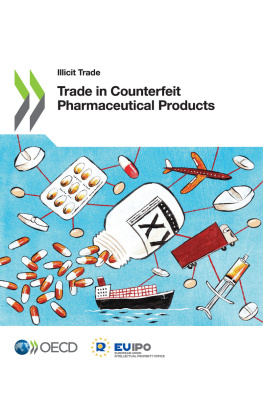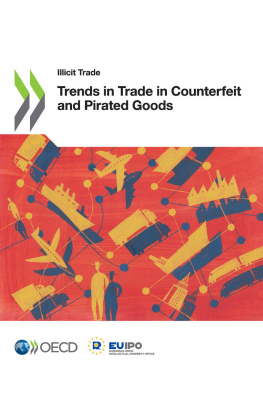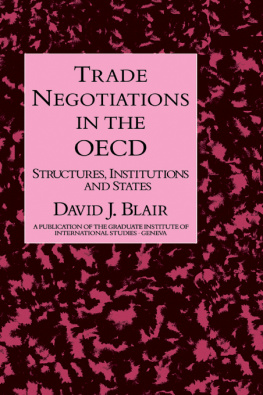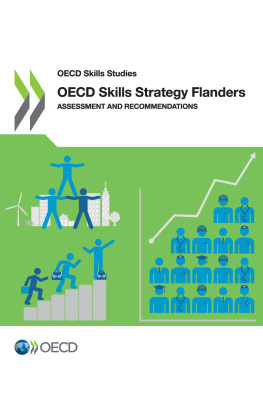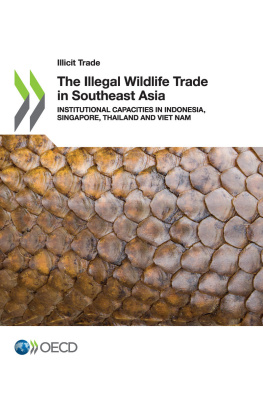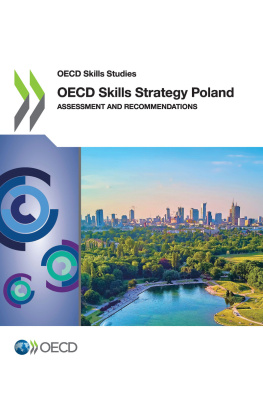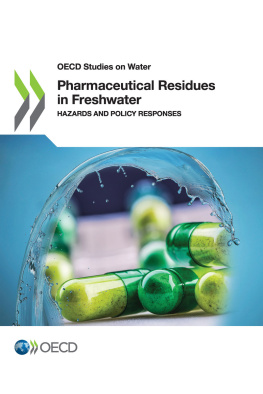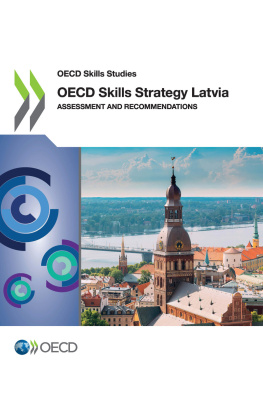OECD and EUIPO - Trade in Counterfeit Pharmaceutical Products
Here you can read online OECD and EUIPO - Trade in Counterfeit Pharmaceutical Products full text of the book (entire story) in english for free. Download pdf and epub, get meaning, cover and reviews about this ebook. year: 2020, publisher: OECD Publishing, genre: Politics. Description of the work, (preface) as well as reviews are available. Best literature library LitArk.com created for fans of good reading and offers a wide selection of genres:
Romance novel
Science fiction
Adventure
Detective
Science
History
Home and family
Prose
Art
Politics
Computer
Non-fiction
Religion
Business
Children
Humor
Choose a favorite category and find really read worthwhile books. Enjoy immersion in the world of imagination, feel the emotions of the characters or learn something new for yourself, make an fascinating discovery.
- Book:Trade in Counterfeit Pharmaceutical Products
- Author:
- Publisher:OECD Publishing
- Genre:
- Year:2020
- Rating:4 / 5
- Favourites:Add to favourites
- Your mark:
- 80
- 1
- 2
- 3
- 4
- 5
Trade in Counterfeit Pharmaceutical Products: summary, description and annotation
We offer to read an annotation, description, summary or preface (depends on what the author of the book "Trade in Counterfeit Pharmaceutical Products" wrote himself). If you haven't found the necessary information about the book — write in the comments, we will try to find it.
Trade in Counterfeit Pharmaceutical Products — read online for free the complete book (whole text) full work
Below is the text of the book, divided by pages. System saving the place of the last page read, allows you to conveniently read the book "Trade in Counterfeit Pharmaceutical Products" online for free, without having to search again every time where you left off. Put a bookmark, and you can go to the page where you finished reading at any time.
Font size:
Interval:
Bookmark:
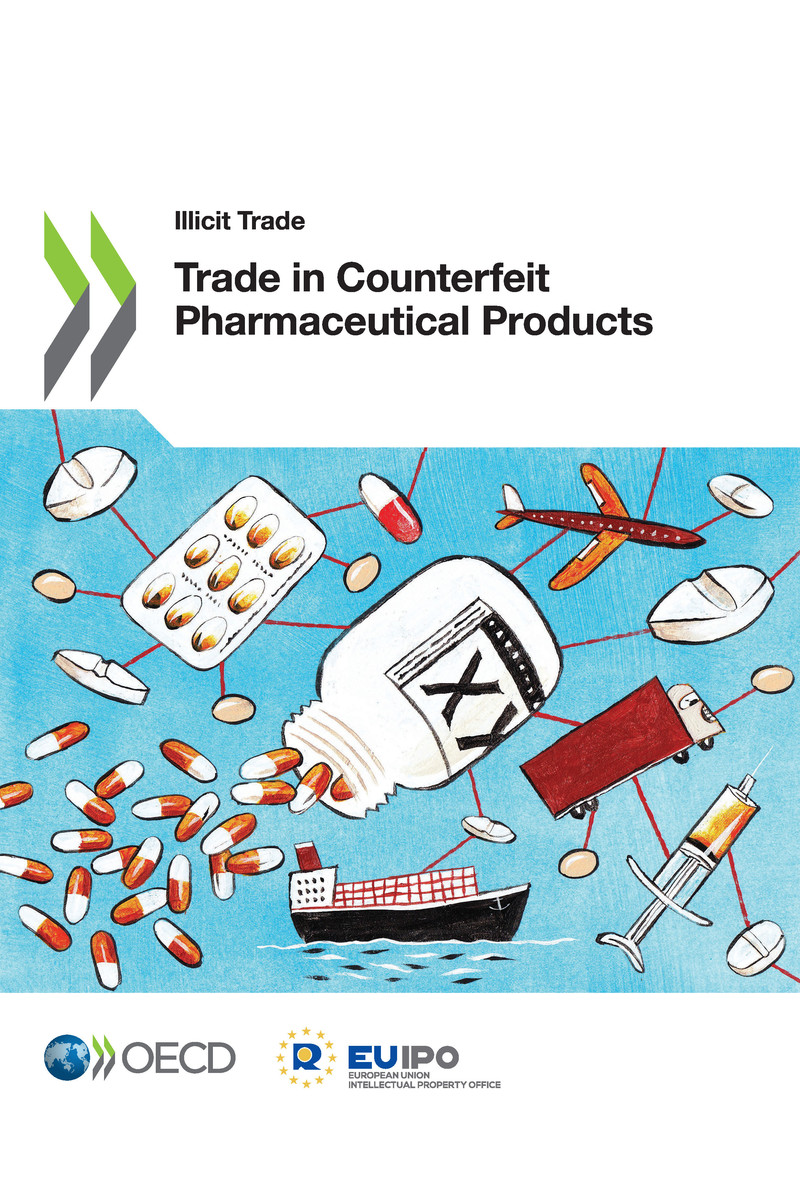
OECD/EUIPO (2020), Trade in Counterfeit Pharmaceutical Products , Illicit Trade, OECD Publishing, Paris, https://doi.org/10.1787/a7c7e054-en .
The information in this document with reference to Cyprus relates to the southern part of the Island. There is no single authority representing both Turkish and Greek Cypriot people on the Island. Turkey recognises the Turkish Republic of Northern Cyprus (TRNC). Until a lasting and equitable solution is found within the context of the United Nations, Turkey shall preserve its position concerning the Cyprus issue.
The Republic of Cyprus is recognised by all members of the United Nations with the exception of Turkey. The information in this document relates to the area under the effective control of the Government of the Republic of Cyprus.
Globalisation, trade facilitation, and the rising economic importance of intellectual property are all drivers of economic growth. However, they have also created new opportunities for criminal networks to expand the scope and scale of their operations, free-riding on intellectual property and polluting trade routes with counterfeit goods. The consequences for the economy and for citizens are serious. Trade in counterfeit goods not only damages economic growth but also undermines good governance, the rule of law and citizens trust in government, and can ultimately threaten political stability. In addition, in some cases, such as that of fake pharmaceuticals, counterfeit goods can have serious health and safety implications for citizens.
We are confident that this new evidence will make a major contribution to the understanding of the volume, magnitude and harmful societal effects of illicit trade in counterfeit medicines. We are confident that the results about both the economic harm caused by this threat and its damaging impact on health will urge policy makers to shape effective solutions to combat and deter this scourge.

Christian Archambeau,
Executive Director,
EUIPO

Janos Bertok,
Acting Director,
OECD Public Governance Directorate
Illicit trade in fake goods is a significant and growing threat in a globalised and innovation-driven economy, undermining good governance, the rule of law and citizens trust in government. It not only has a negative impact on the sales and profits of affected firms and on the economy in general, but also poses major health and safety threats to consumers.
To provide policy makers with solid empirical evidence about this threat, the OECD and the EU Intellectual Property Office (EUIPO) joined forces to carry out a series of analytical studies that deepen our understanding of the scale and magnitude of the problem. The results have been published in a set of reports: Trade in Counterfeit and Pirated Goods: Mapping the Economic Impact (2016), Mapping the Real Routes of Trade in Fake Goods (2017), Trade in Counterfeit Goods and Free Trade Zones: Evidence From Recent Trends (2018), Why do countries Export Fakes (2018), Misuse of Small Parcels for Trade in Counterfeit Goods (2018) and Trends in Trade in Counterfeit and Pirated Goods (2019). The results are alarming. They show that trade in counterfeit and pirated goods amounted to up to 3.3 % of world trade in 2016, up from 2.5 % in 2013; when considering only the imports into the EU, they amounted to up to 6.8 % of imports, compared with 5 % three years earlier. Counterfeiters operate swiftly in the globalised economy, misusing free trade zones, taking advantage of many legitimate trade facilitation mechanisms and thriving in economies with insufficient governance standards.
Trade in counterfeit and pirated goods is a dynamic and constantly changing phenomenon. Continuous measurement efforts are needed to monitor this risk. This report presents updated figures on the scale, scope and magnitude of trade in counterfeit pharmaceuticals, based on a statistical analysis of a unique database of half a million seizures of counterfeit goods. Structured interviews with trade and customs experts also contributed to the analysis.
This report builds on previous analyses, focusing on the situation in one particular sector: pharmaceuticals. Counterfeits imply not only possible economic damages for this sector, but also significant health threats, since fake medicines are often not properly formulated and may contain dangerous ingredients. Counterfeit medicines have included medicaments for serious diseases, including malaria, HIV/AIDS and cancer. The scale is huge in 2016, international trade in counterfeit pharmaceuticals reached USD 4.4 billion.
This report responds to major policy concerns. The first is the negative effect that counterfeit trade has on legitimate competitive advantage of rights holders, and consequently on innovation, employment and long-term economic growth. The second one is the damaging impact of crime and illicit trade activities on good governance, public health and safety.
This report was prepared by the OECD Public Governance Directorate together with the European Union Intellectual Property Office (EUIPO).
At the OECD this study was conducted under the Task Force on Countering Illicit Trade (TF-CIT). The study was shared with other OECD committees with relevant expertise in the area of trade, health policy and innovation.
The report was prepared by Piotr Stryszowski, Senior Economist and Florence Mouradian, Economist at the OECD Directorate for Public Governance jointly with Micha Kazimierczak, Economist at the European Observatory on Infringements of Intellectual Property Rights of the EUIPO and Nathan Wajsman, Chief Economist, EUIPO. The authors wish to thank the OECD experts, who provided valuable knowledge and insights: Morgane Gaudiau and Nikolai Malyshev from the OECD Public Governance Directorate, Valrie Paris and Martin Wenzl from the OECD Directorate for Employment, Labour and Social Affairs, and Susan Stone from the OECD Trade Directorate.
Font size:
Interval:
Bookmark:
Similar books «Trade in Counterfeit Pharmaceutical Products»
Look at similar books to Trade in Counterfeit Pharmaceutical Products. We have selected literature similar in name and meaning in the hope of providing readers with more options to find new, interesting, not yet read works.
Discussion, reviews of the book Trade in Counterfeit Pharmaceutical Products and just readers' own opinions. Leave your comments, write what you think about the work, its meaning or the main characters. Specify what exactly you liked and what you didn't like, and why you think so.

